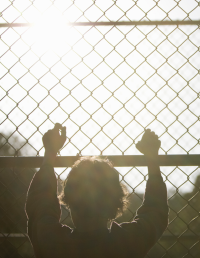New Settlement Ends Delays That Kept Immigrant Children in Detention
The Trump administration used fingerprint background checks to delay the release of immigrant children from detention
FOR IMMEDIATE RELEASE:
July 28, 2022
NEW YORK — The New York Civil Liberties Union, American Civil Liberties Union, National Center for Youth Law, and the law firm Morrison Foerster today announced a settlement in Duchitanga v. Lloyd, their 2018 case challenging the Trump administration’s delayed release of immigrant children to parents and sponsors due to new fingerprint background check requirements.
The fingerprint policy kept children detained for long periods away from their parents, adding weeks and months to their time in government custody. At the same time, the Office of Refugee Resettlement (ORR) adopted new policies to share fingerprints and other information with Immigration and Customs Enforcement (ICE) for enforcement purposes, deterring parents and sponsors from reunifying with their children.
In 2019, under pressure from the New York Civil Liberties Union, American Civil Liberties Union, National Center for Youth Law, and Morrison Foerster, and faced with the threat of a preliminary injunction, the federal government rolled back virtually all of the fingerprinting policies challenged in the case. Since then, fingerprinting delays have largely been eliminated. The government has opened up new fingerprinting sites around the country and has scaled back fingerprinting requirements to match pre-2018 policies. This settlement will prevent these harmful fingerprinting policies and delays from being reinstated by current or future administrations.
The plaintiffs in the case include Blanca Ortiz, whose two children were put in ORR custody in July 2018 and remained in detention for nearly four months due to the Trump administration’s fingerprint policy. “I’ll always remember the months when the government kept me separated from my two sons. There is no greater pain that can be caused than when you separate a child from their mother,” said Blanca. “After my fingerprint appointments, every time I asked my children’s caseworker how long it would take to receive the results back, she said the same thing: that the process was slow, and it was not in her hands. My sons suffered tremendously while in custody. I never, never want to go through this again, and I don’t want this to happen to anyone else. It is inhumane.”
“The longer children are detained the more likely they are to suffer irreversible psychological harm, relive trauma, fall behind in school, and, for those who turn 18 in custody, risk being transferred to an adult facility,” said Bobby Hodgson, supervising attorney at the New York Civil Liberties Union. “We still have a very long way to go in protecting immigrant children in government custody, but this agreement is a valuable step.”
The settlement establishes a set of presumptive deadlines for the government to schedule fingerprinting appointments and complete fingerprint processing for parents and sponsors seeking to be reunited with children in government custody: 7 business days for an appointment and 10 business days for processing. The standard will apply to all children nationally in ORR custody, and the agency will also be required to regularly release reports about their process and results during this period—tracking, for the first time, how long fingerprinting takes across the agency.
“In the fall of 2018, I interviewed children detained in a massive, unlicensed facility where they slept in tents in the desert. Most of them would have been with their families but for the government’s harmful fingerprint policies. Their distress, anguish and sense of hopelessness was palpable,” said Neha Desai, senior director of immigration at National Center of Youth Law. “This settlement will help ensure that punitive fingerprint policies never again facilitate this version of family separation.”
“The Trump administration created these policies as another way to punish immigrant families,” said ACLU attorney Stephen Kang. “This settlement aims to keep this from happening again, and serves as notice to the government that it cannot let children cruelly languish apart from their parents or sponsors.”
“We hope these changes mean children are quickly reunited with their families,” said Michael Birnbaum, Morrison Foerster partner. “MoFo is proud to serve as a partner in the case, guided by our principle to serve those who otherwise are often neglected by the justice system.”






